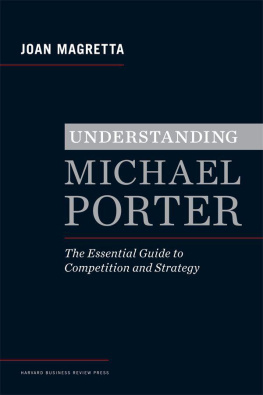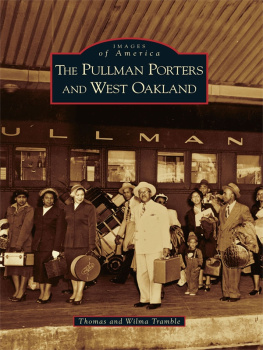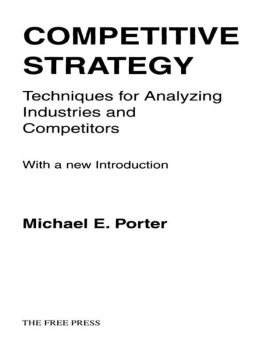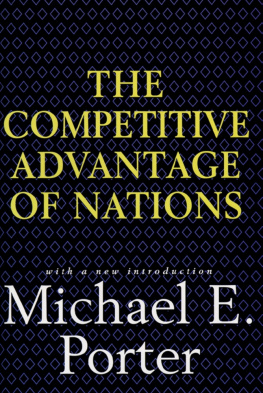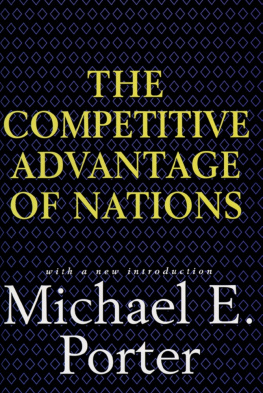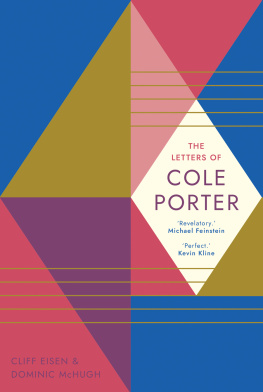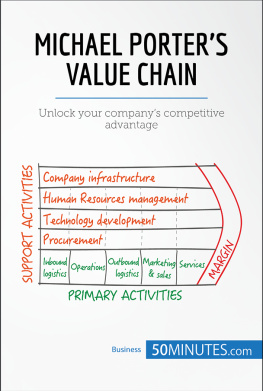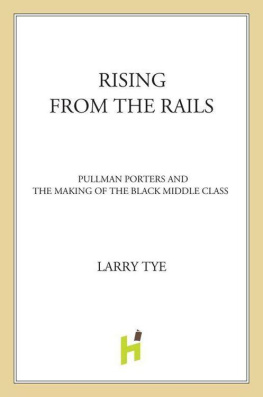
Copyright 2012 Joan Magretta
All rights reserved
No part of this publication may be reproduced, stored in or introduced into a retrieval system, or transmitted, in any form, or by any means (electronic, mechanical, photocopying, recording, or otherwise), without the prior permission of the publisher. Requests for permission should be directed to , or mailed to Permissions, Harvard Business School Publishing, 60 Harvard Way, Boston, Massachusetts 02163.
ISBN: 978-1-4221-6059-6
By his example, Arthur Rosin, my uncle, taught me the pleasures of understanding and explaining. This book is dedicated to him, to Betty Rosin, and to my parents, Cyrille and Eugene Gorin.
Contents


The Michael Porter I know is first and foremost a gifted teacher. If this book succeeds in helping readers understand Porters ideas in their full richness, it is thanks in large measure to his encouragement, his guidance, and his patience in explaining those ideas to me. As this book progressed, he carefully reviewed every chapter, giving generously both his time and his laser-sharp attention.
The company examples I have used to illustrate Porters ideas draw not only on his work, but also on that of many researchers and business writers. Where I have used published sources, I cite them in the chapter notes. I also want to acknowledge the unpublished work done by the fine research associates at the Institute for Strategy and Competitiveness (ISC) at Harvard Business School (HBS), and especially by Andrew Funderburk.
Many colleagues and friends made helpful suggestions about earlier drafts of this book. Three of them went far beyond the call of duty. Jan Rivkin, who teaches strategy at HBS, did his best to keep me from cutting too many intellectual corners. Ellyn McColgan, a seasoned executive, was relentless in asking how Porters work matters to managers. Paula Duffy, the distinguished publisher and book lover extraordinaire, provided invaluable advice about every aspect of this project. In addition I am grateful for the suggestions of Regina Fazio Maruca and Alice Howard; and for the support of Chris Allen, of Baker Library; Lydia Graham, of the ISC; and Allison Peter of Harvard Business Review Press.
We all need wise counselors and cheerleaders. Rafe Sagalyn and Cyrille Gorin were mine, urging me to write this book in the first place and helping me to get started. Melinda Merino has been the consummate editor. Her judgment and support have made this a better book.
Lastly, special thanks go to my husband, Bill Magretta. This isnt the obligatory spousal thank-you-for-putting-up-with-me. Bill is, and always has been, my secret weapon, the smartest reader I know.
M ICHAEL PORTER DIDNT GET to be a giant in the field of competition and strategy by hunting small game. Very early in his career, he went after the single biggest and most consequential question in business: Why are some companies more profitable than others? One big question led to another. Why are some industries consistently more profitable than others, and what does this mean for the manager developing a strategy? Why are some countries or regions more successful than others, and what does this mean for companies in a global era? Since the publication of his groundbreaking classics, Competitive Strategy (1980) and Competitive Advantage (1985), Michael Porter has been steadily building answers to these fundamental questions about competition and competitive success. What could be more important for managers?
The thing about classics, as Mark Twain once observed, is that they are often books that everybody wants to have read and nobody wants to read. Tackling Porters work can be a bit like undertaking a serious exercise regimen. It will be good for you, even transformative. But it wont be easy, especially for managers who already have too much on their plates. Where to begin? How to navigate thousands of pages of writing, some of it written for scholars as well as managers? Do you start with the earliest work, which is also the densest? Or do you try to jump in on the latest thinking, without first mastering the basics? The good news is that Porters work is ambitious and deep. That is the bad news as well: his writing demands more effort and concentration than many readers today think they can spare.
But if you are serious about strategy, Porters work is the foundation. This book distills the essence of that work for managers. If there can be such a thing as a book-length executive summary, this is it. My premise in writing this book is very simply that clear strategic thinking is essential for any manager in any setting, and Porters work lays out the basic principles and frameworks you need to master. My goal is to present the essential Porter in a form that can be more easily digested and put to work than the original. But, to extend my metaphor, if you really want to digest these critically important ideas, you have to be willing to chew on them before you swallow. Strategy is not fast food, and neither is Porter.
The essence of strategy, Porter often says, is choosing what not to do. You might want to read that last sentence a second time, because it probably accounts for more failures of strategy than any other cause. In setting out my strategy for this book, I resolve to practice what Porter preaches. In a nutshell, here is what this book is not:
- It is not an academic book for scholars of strategy. This book is aimed at managers, and at those who advise and work with them.
- It is not an attempt to summarize all of Porters work. This book focuses on competition and strategy, leaving out lots of great work on topics such as economic development or the application of competitive principles to social problems such as health care and the environment.
- It is not an extension of Porters work. I do, however, integrate ideas that were developed at different stages in Porters career, updating the earlier work to reflect later extensions of it. I have benefited from Porters full cooperation, including access to the latest material from unpublished speech transcripts and lectures.
- It is not primarily a how-to book, in the sense that a book about aerodynamics and the principles of flight would not, alone, qualify you for a pilots license. This is more of a how-to-think-about book, one that will help you to recognize a good (or bad) strategy when you see one and to tell the difference between a solid strategy and the latest management fad.
Why Now?
Porters work, while never trendy and always relevant, has never been as timely for so many people working in both the private and the public sectors as it is today. This is a time of enormous economic upheaval in many industries and countries around the world. Amidst that upheaval, competition is at a crossroads. It is extolled by some as a path, indeed the only path, to growth and prosperity. It is feared and hated by others who see it as a destructive race to the bottom. And strategy itself has come under fire: some argue that execution, not strategy, is the only path to competitive success. They claim that even if an organization creates a competitive advantage, it simply cannot last in todays hypercompetitive world, so why bother? These are dangerous misconceptions. Master the essential Porter and you will understand not only how companies sustain competitive advantages for decades, but also why strategy is even more importantnot less soin turbulent and uncertain times.

